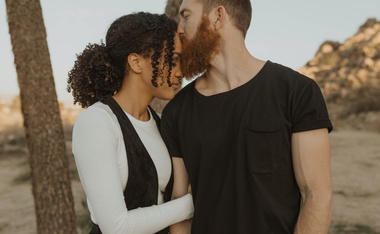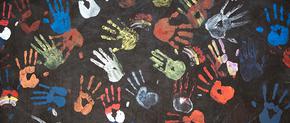The views expressed in our content reflect individual perspectives and do not represent the authoritative views of the Baha'i Faith.
This second part in a series of articles documenting a dialogue with my friend, Misha – a Soviet Union ex-pat – reveals some of his very strong opinions about the impossibility of a racially unified humanity.
Like me, Misha comes from Slavic and Ashkenazi Jewish descent, and had a very personal stake in the idea of interracial marriage; his son had married a Black Muslim woman, which did not make Misha happy. Despite the fact that he loved the grandsons who were the product of the union, he felt it was a grave mistake to allow “races” to mix in any way.
When I told him about the Baha’i philosophy on racial and ethnic intermarriage – that it constitutes “a great service to humanity,” as Abdu’l-Baha said – it shocked him.
If it be possible, gather together these two races, black and white, into one Assembly, and put such love into their hearts that they shall not only unite but even intermarry. Be sure that the result of this will abolish differences and disputes between black and white. Moreover, by the Will of God, may it be so. This is a great service to humanity.
RELATED: Interracial Marriage: Stories of Integration and Activism
So Misha had many questions about intermarriage, which he viewed as a consequent “loss” of identity, starting with this one:
Q: If dark skin turned out to be a dominant feature as races intermarry, would you still recommend having one joyful group of mankind? What if you wanted to save your racial identity as a blue-eyed blond?
A: First of all, there’s nothing wrong with a person of any color passing that trait on. Why should it inspire fear of loss?
Second, my identity as a brown-eyed brunette is superficial and changeable. I can alter those ephemeral traits with contact lenses and hair dye. It’s also a set of attributes that have no real bearing on my individual identity. So no amount of intermarrying by my children or anyone else’s children affects MY identity as an individual. I would be a poor parent if I insisted that my children should choose mates to preserve something as ephemeral as a skin tone.
When I met my husband, he was honey blonde with green eyes that changed color. His hair eventually went so dark, our youngest daughter called it black. All three of my children look very Slavic, two have my brown hair and eyes, but my youngest daughter has her dad’s coloring. Would you suggest that I should love the children that have my coloring more because they share my superficial attributes? That seems silly to me. Would you love your son less if he had more of your wife’s physical features than yours?
My point, of course, is that this so-called identity is only skin deep. It is subject to change. It’s not what or who I am. It’s just a “suit” I wear. My spirit has no color. It has no gender. It has no national identity. Color is absolutely meaningless. I am my thoughts, my loves (and my hates).
When I go to the Baha’i Center here in San Jose for a gathering, I am embraced by people who are Black (from several different countries), Caucasian, Hispanic, Persian, and on and on. You’d look at us and say “Those people are all different. They have separate racial identities.” This might lead you to think we had nothing in common. But that’s not true. Yes, we’re different superficially, but our shared identity as humans and Baha’is unifies us.
RELATED: Jack Gordon: Deepening Our Shared Spiritual Identity
Beyond that, we have everything in common: we are mothers, fathers, sisters, brothers, we are someone’s children, we love our fellow human beings, we work toward the same goals. One of those goals is to not allow a superstition to overcome the strength of our shared identity.
The unity of humanity is a scientific and spiritual fact, the realization of which has been millions of years in the making. In past ages we’ve lacked the imperative of recognizing and the means of practicing that unity. We now have both the imperative and the means, and as Abdu’l-Baha proclaimed, the time has arrived for humanity, no matter what our region, race, or religion, to unite:
In cycles gone by, though harmony was established, yet, owing to the absence of means, the unity of all mankind could not have been achieved. … In this day, however, means of communication have multiplied, and the five continents of the earth have virtually merged into one. … Hence the unity of all mankind can in this day be achieved.
















Comments
Sign in or create an account
Continue with Googleor